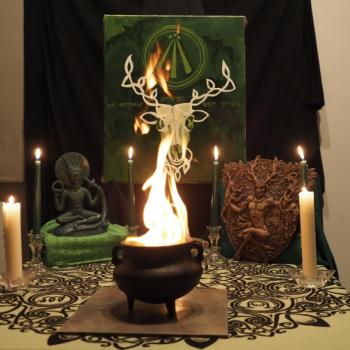Here’s a rather long question that does a good job of setting up an important topic.
I’ve been feeling pulled by the deities I work with to do more magic, but I’m struggling with creating my own code of magical ethics. Anything that I’ve been able to find on the topic either just touts the Rule of Three (which is decidedly unhelpful as I’m not Wiccan) or lacks nuance (either says it’s never okay to cast magic that affects someone else or that it’s okay to curse people for the smallest things).
In one of your blog posts you mentioned that cursing is the magical equivalent of punching someone in the face. That makes sense to me and I can understand where that would be needed.
I’m stuck more in the in-between and wondering if I feel okay about casting spells that impact other people (baneful or not) and in what circumstances.
Let’s start by going someplace you probably weren’t expecting.
I never paid much attention to the John Wick movies, but I heard very good things about the fourth one that came out in March. And so I watched the first three on one of the streaming platforms and went to the theater to see the fourth. I enjoyed them more than I expected, and a few things stuck with me.
One of them was the phrase “how you do anything is how you do everything.”
I think that’s very appropriate here. Ultimately there are no special ethics around magic. There are just ordinary ethics applied in a magical context.
What I’d like to do in this post is discuss some ethical concepts that frequently come up and how they ultimately aren’t helpful. And then I want to look at how we can apply our everyday ethics when it comes to our magic.
There is no metaphysical High Table
Which is a Wick-ish way of saying that I see no evidence the Rule of Three works. In case you aren’t familiar with it, the Rule of Three is a Wiccan concept that says whatever you send out comes back to you threefold, good for good and ill for ill.
For things to work like that, there would have to be some cosmic scorekeeper maintaining records of what everyone is doing and how it worked out. I can’t imagine how that could work, and more importantly, I see no indication that it does.
Karma is a Hindu concept concerning reincarnation. It does not work in the short term way most Western New Agers seem to think it does.
I do believe in what John Michael Greer called “the strawberry jam effect” – you can’t work with it without getting it all over yourself. That’s one of the main reasons I don’t do a lot of baneful magic, even when people do things that harm me. I know that the more I work with aggressive and forceful magic, the more aggressive and forceful I will become, and I don’t want that.
In any case, ethics don’t exist to help people avoid punishment. Ethics exist to help people do the right thing in the first place.
There is no cosmic “balance” to keep
Another unhelpful idea I often see around magical ethics is that there’s some sort of cosmic “balance” that must be maintained, and any working that disturbs it requires payment.
This idea isn’t entirely wrong. Spirits don’t work for free. Either you have an on-going reciprocal relationship with them (not likely if you’re summoning demons) or you pay them – in whatever currency you can persuade them to take.
But for spells that work by way of energy manipulation, correspondences (like controls like), visualization, sigils, and such, there is no one to pay. Like solar energy, it’s just there. You don’t have to pay for it, you have to figure out how to collect it and transform it into what you want.
In the end, either you can do the spell or you can’t. There is no balance to maintain.
The absolutely autonomy of the individual human is not the greatest good
It’s been said that the witches who performed Operation Cone of Power during World War II would not bind Hitler, because they believed interfering with the free will of another was entirely unethical. I don’t know if that’s true or not, but I know a lot of witches and other magicians who will not do magic that interferes with anyone else’s free will.
I don’t know how you do that. The whole world is interconnected. Pull on one string and something begins unraveling a thousand miles away… or next door. There is no such thing as zero impact – there is no such thing as “harm none.”
And some people need to be bound – they need to be constrained from harming others. I didn’t participate in the mass binding of Donald Trump, but that was a disagreement about the most effective methods, not any ethical concern. I’ve done bindings before (yes, they worked) and I’m pretty sure I’ll need to do them again.
Protecting you and yours is good and necessary, whether you use magic or mundane effort.
There’s enough to go around
Let’s say there’s a job opening and you really want it. Should you work magic to help you get it? What if there’s someone else who’s applying for the same job – maybe they need it more than you do.
The bounty of the Earth is enough to supply the needs of everyone. There are shortages because there are systemic imbalances between needs and supplies – how to best address that is an economic and political question beyond the scope of this post. The point is that if you get Job A and the other candidate doesn’t, there may very well be a Job B out there that you may not have even heard of that would be even better for them. That’s not certain, but what is certain is that you taking what you need doesn’t keep other people from getting what they need (yes, there are Donner Party level exceptions, but those are rare exceptions, not the rule).
Never feel bad about working magic for what you need and, within the scope of ordinary ethics, for what you want.
Consequences
Another line that stood out in the John Wick movies was an oft-repeated one-word sentence: “consequences.” Or, as countless parents have asked countless teenagers, “well what did you think would happen?”
If you begin a certain course of action – magical or mundane or both – there will be consequences. There will be results. Maybe they’re good. Maybe they’re bad. Likely they’re a mixture of both.
This is where divination comes into play. Divination doesn’t tell us what must happen, it tells us what will happen. If you do X, the outcome will be Y. Do you like that? Good – keep walking down that path. Do you not like it? Then take action to make a change now, so you end up in a better situation.
There are always unintended consequences in magic – things we didn’t expect but probably should have considered. The example I often see is working a money spell and then getting an inheritance from a relative who suddenly died, who you would have preferred to go on living.
I can’t recall ever seeing this happen in practice, or anything so dramatic. What I have seen are people whose spells worked very well, but they didn’t like the results because they picked the wrong target.
Magic doesn’t bring what you want. Magic brings what you actually work for, whether that’s what you meant or not, and many times in ways you never imagined.
How you do anything is how you do everything
Cursing is the equivalent of punching someone in the face – or worse. But sometimes you have to punch a bully in the face to get him to stop.
I can’t give you a bunch of rules to follow. If you need rules you’re in the wrong religion.
What I can do is ask “would you feel right if this happened through mundane means?” Assuming you could, of course. We often curse bullies because physically punching them in the face can lead to physical retaliation, or to assault charges. But ethically speaking, it doesn’t matter if you use a wand or a baseball bat. Are you OK with that?
Most ethical questions aren’t so dramatic, but the process is the same. Think about what you want – is it in alignment with your values? Think about what will have to happen for you to get it – are the consequences acceptable? What unintended consequences are likely to arise – can you mitigate them? And if not, can you live with them?
And if you can’t, what then? What happens if you don’t work the magic and you don’t achieve the goal? Is that acceptable? What other options are out there?
But at the end of the day, there’s no such thing as magical ethics. There are just ethics.
How you do anything is how you do everything.




















